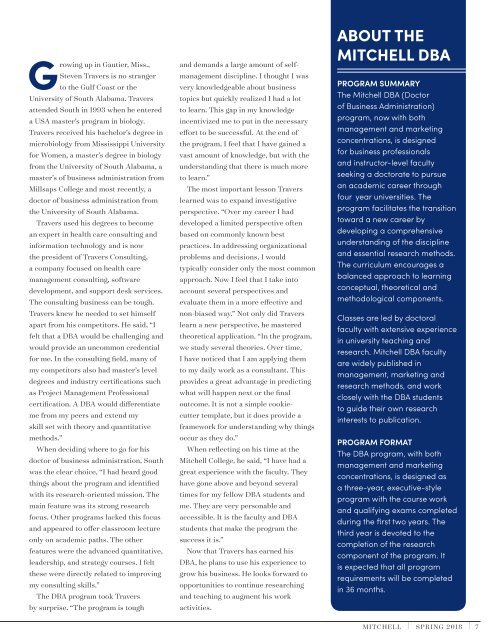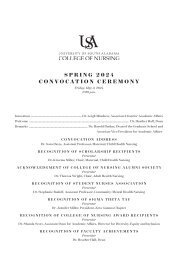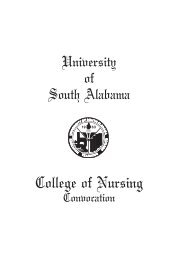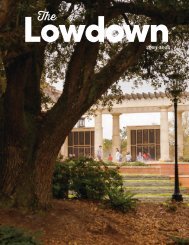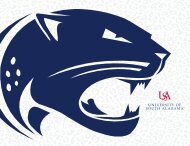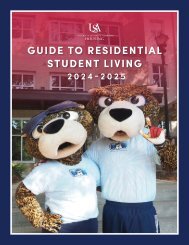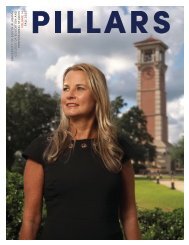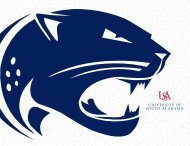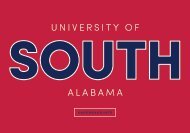MITCHELL_S18_final
You also want an ePaper? Increase the reach of your titles
YUMPU automatically turns print PDFs into web optimized ePapers that Google loves.
Growing up in Gautier, Miss.,<br />
Steven Travers is no stranger<br />
to the Gulf Coast or the<br />
University of South Alabama. Travers<br />
attended South in 1993 when he entered<br />
a USA master’s program in biology.<br />
Travers received his bachelor’s degree in<br />
microbiology from Mississippi University<br />
for Women, a master’s degree in biology<br />
from the University of South Alabama, a<br />
master’s of business administration from<br />
Millsaps College and most recently, a<br />
doctor of business administration from<br />
the University of South Alabama.<br />
Travers used his degrees to become<br />
an expert in health care consulting and<br />
information technology and is now<br />
the president of Travers Consulting,<br />
a company focused on health care<br />
management consulting, software<br />
development, and support desk services.<br />
The consulting business can be tough.<br />
Travers knew he needed to set himself<br />
apart from his competitors. He said, “I<br />
felt that a DBA would be challenging and<br />
would provide an uncommon credential<br />
for me. In the consulting feld, many of<br />
my competitors also had master’s level<br />
degrees and industry certifcations such<br />
as Project Management Professional<br />
certifcation. A DBA would diferentiate<br />
me from my peers and extend my<br />
skill set with theory and quantitative<br />
methods.”<br />
When deciding where to go for his<br />
doctor of business administration, South<br />
was the clear choice, “I had heard good<br />
things about the program and identifed<br />
with its research-oriented mission. The<br />
main feature was its strong research<br />
focus. Other programs lacked this focus<br />
and appeared to ofer classroom lecture<br />
only on academic paths. The other<br />
features were the advanced quantitative,<br />
leadership, and strategy courses. I felt<br />
these were directly related to improving<br />
my consulting skills.”<br />
The DBA program took Travers<br />
by surprise. “The program is tough<br />
and demands a large amount of selfmanagement<br />
discipline. I thought I was<br />
very knowledgeable about business<br />
topics but quickly realized I had a lot<br />
to learn. This gap in my knowledge<br />
incentivized me to put in the necessary<br />
efort to be successful. At the end of<br />
the program, I feel that I have gained a<br />
vast amount of knowledge, but with the<br />
understanding that there is much more<br />
to learn.”<br />
The most important lesson Travers<br />
learned was to expand investigative<br />
perspective. “Over my career I had<br />
developed a limited perspective often<br />
based on commonly known best<br />
practices. In addressing organizational<br />
problems and decisions, I would<br />
typically consider only the most common<br />
approach. Now I feel that I take into<br />
account several perspectives and<br />
evaluate them in a more efective and<br />
non-biased way.” Not only did Travers<br />
learn a new perspective, he mastered<br />
theoretical application. “In the program,<br />
we study several theories. Over time,<br />
I have noticed that I am applying them<br />
to my daily work as a consultant. This<br />
provides a great advantage in predicting<br />
what will happen next or the fnal<br />
outcome. It is not a simple cookiecutter<br />
template, but it does provide a<br />
framework for understanding why things<br />
occur as they do.”<br />
When refecting on his time at the<br />
Mitchell College, he said, “I have had a<br />
great experience with the faculty. They<br />
have gone above and beyond several<br />
times for my fellow DBA students and<br />
me. They are very personable and<br />
accessible. It is the faculty and DBA<br />
students that make the program the<br />
success it is.”<br />
Now that Travers has earned his<br />
DBA, he plans to use his experience to<br />
grow his business. He looks forward to<br />
opportunities to continue researching<br />
and teaching to augment his work<br />
activities.<br />
ABOUT THE<br />
<strong>MITCHELL</strong> DBA<br />
PROGRAM SUMMARY<br />
The Mitchell DBA (Doctor<br />
of Business Administration)<br />
program, now with both<br />
management and marketing<br />
concentrations, is designed<br />
for business professionals<br />
and instructor-level faculty<br />
seeking a doctorate to pursue<br />
an academic career through<br />
four -year universities. The<br />
program facilitates the transition<br />
toward a new career by<br />
developing a comprehensive<br />
understanding of the discipline<br />
and essential research methods.<br />
The curriculum encourages a<br />
balanced approach to learning<br />
conceptual, theoretical and<br />
methodological components.<br />
Classes are led by doctoral<br />
faculty with extensive experience<br />
in university teaching and<br />
research. Mitchell DBA faculty<br />
are widely published in<br />
management, marketing and<br />
research methods, and work<br />
closely with the DBA students<br />
to guide their own research<br />
interests to publication.<br />
PROGRAM FORMAT<br />
The DBA program, with both<br />
management and marketing<br />
concentrations, is designed as<br />
a three-year, executive-style<br />
program with the course work<br />
and qualifying exams completed<br />
during the frst two years. The<br />
third year is devoted to the<br />
completion of the research<br />
component of the program. It<br />
is expected that all program<br />
requirements will be completed<br />
in 36 months.<br />
<strong>MITCHELL</strong> | SPRING 2018 | 7


